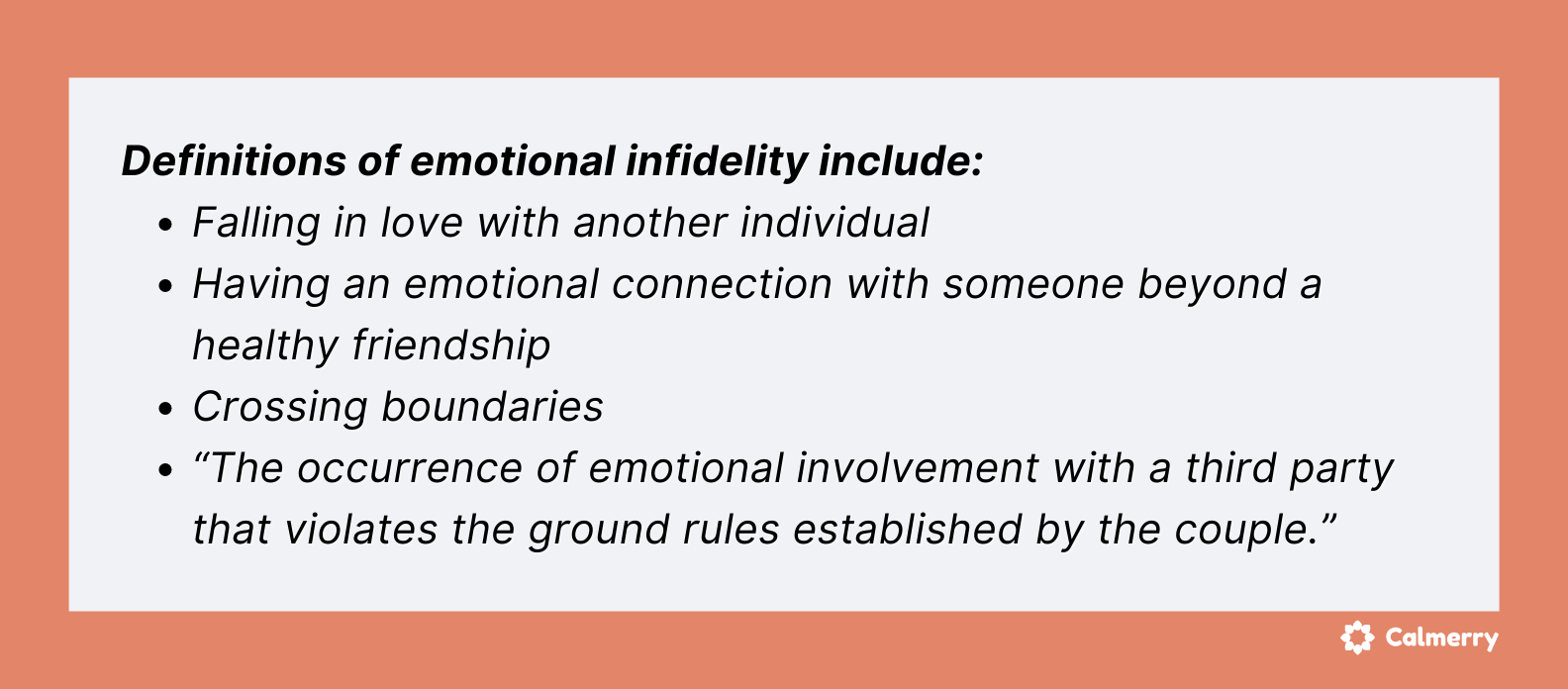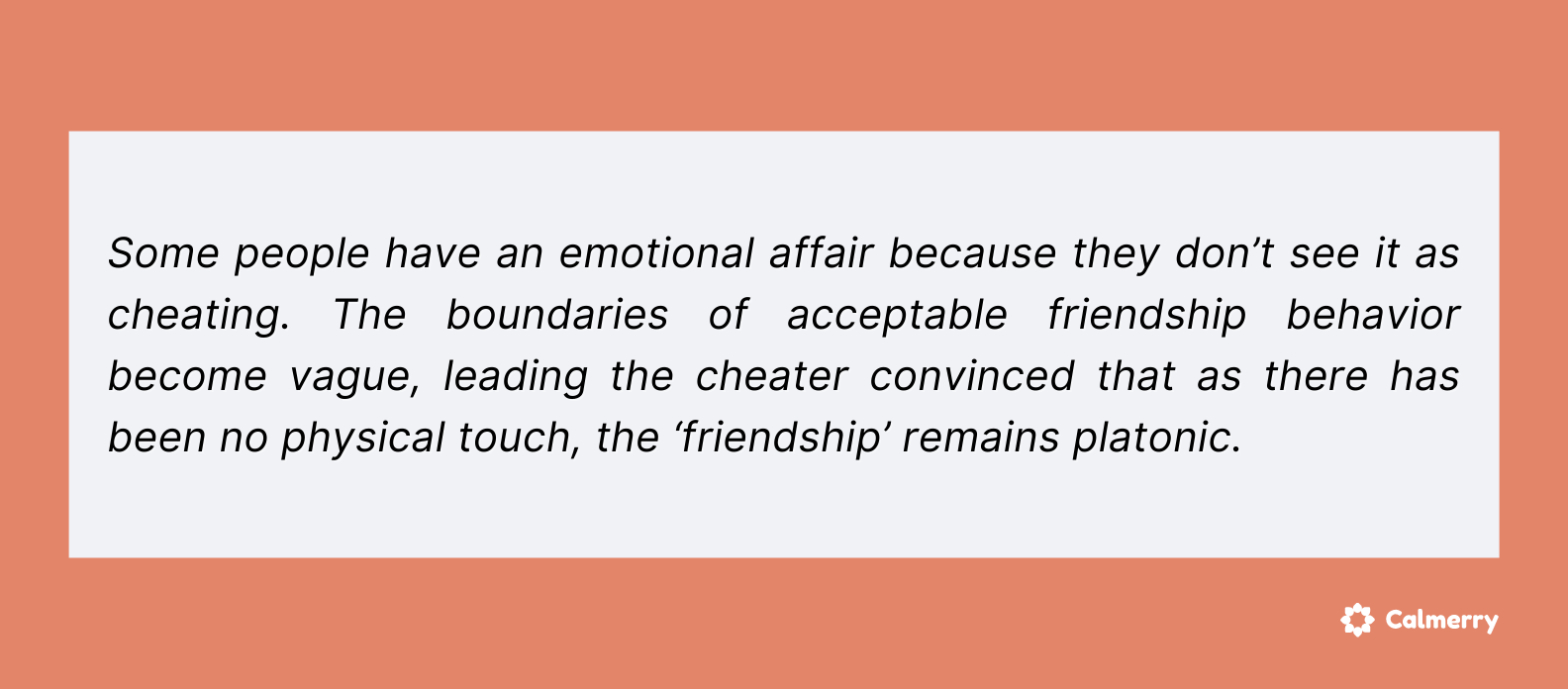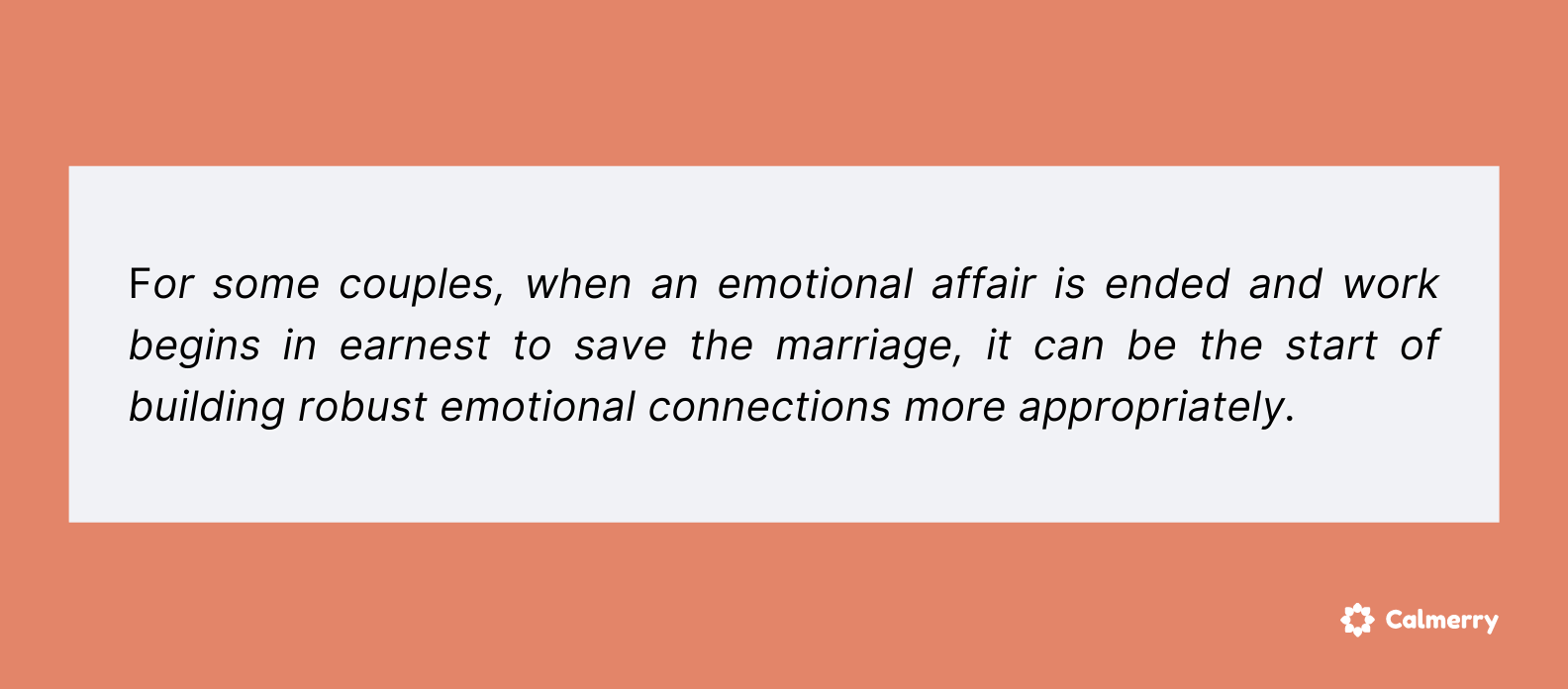Playing with Fire: How to Know Your Partner Is Having an Emotional Affair

In this article
Emotional affairs are on the rise in the USA. In the past, affairs were conducted in person or during snatched moments on the phone. Today, technology makes it easy to meet someone virtually or communicate discreetly with someone you know in real life. Unlike a sexual affair, your partner could be sharing themselves with someone else at any time of the day or night, even when you are with them.
It is important to understand the signs of an emotional affair and know what to do if you suspect that your partner is being unfaithful to you.
What Is an Emotional Affair?
Sometimes it can be difficult to distinguish between a close, platonic friendship, and an emotional affair. In fact, due to these sometimes blurred lines, psychologists have struggled to agree on what constitutes an emotional affair.

In simple terms, an emotional affair is a form of cheating. It involves a close friendship that may be kept secret or be downplayed by your partner. Friendship often occurs outside of the marriage (rather than being a mutual friend), and your partner may share sensitive or extremely personal information with the other party. Often, a straying spouse gives and receives more emotional support in the affair than they do in their marriage.
Emotional affairs are usually innocuous, to begin with. A friendship may develop at work, the gym, or in a social situation. Gradually an emotional connection and romantic feelings start to develop, and the two individuals begin to share more of their lives in the way that a couple might. Due to the intense feelings that are evoked, emotional affairs can later lead to physical or sexual affairs.
If your partner is imparting more of their thoughts and feelings with someone else than they are with you, then the alarm bells of an emotional affair should start to ring.
How Common Are Emotional Affairs?
As affairs are conducted in secret, it is difficult to accurately ascertain how many people have an affair during their lifetime. However, there is limited evidence to suggest that emotional affairs are becoming increasingly common. Around 45% of men, and 35% of women, have admitted to having an emotional affair. In Sweden, a study found that around a third of people had participated in an online affair that included cybersex.
Also, the 2020 research in the USA found that about 17% of Americans get engaged in extramarital sex at least once in their marriage. It also shows that the prevalence of extramarital sex is higher for blacks compared to whites, and higher for men than women.
Another research from Bedbible.com found that male infidelity has remained steady at around 28% in 2020-2021, whereas for women it is slightly increasing and is now recorded at around 14%.
Sadly, these findings show that if you suspect that your partner is having an emotional or sexual affair, you are not alone.
Why Do People Have Emotional Affairs?
Emotional affairs may be on the rise because of the ease with which they can occur. Even during a global pandemic and societal lockdowns, it remained possible to initiate or develop an emotional affair. Text messaging, web chats, email and video calling all make it easy to be unfaithful without being caught.

Emotional affairs may also occur when one person craves emotional support, connection, or attention that they are not receiving in their own relationship. Emotional connection can start to fade when one or both partners don’t take the time to work on their bond with each other. Rather than discuss their feelings or needs with their spouse, they turn elsewhere to have their needs met.
Occasionally, an emotional affair is an act of revenge, which may be for the other partner’s previous infidelity (sexual or emotional). However, revenge can be sought for a wide variety of other reasons including emotional unavailability, or being distracted, inattentive, ungrateful or unhelpful at home.
Some people become bored within a relationship. The initial spark may have dwindled, or you may have competing pressures such as child-rearing, career aspirations, or financial worries. Engaging in relationship counseling can provide the understanding and guidance often sought outside of a marital bond.
Signs of an Emotional Affair
If you think your spouse might be having an emotional affair, you may have noticed some of the following signs.
- They try to hide their phone, tablet, or laptop, or no longer allow you access to them
- They seem to be working longer hours, or claim to be at the gym or attending events more frequently
- They start to withdraw from you
- You begin to hear a particular name being mentioned frequently
- They become more critical of you
- You might notice that they adopt the views of their ‘friend’, or start to take up the same hobbies as them
- They may decline invitations to do things with you, such as going for dinner or to the movies, but accept the same invitations from their ‘friend’
- They may gaslight you when you raise these concerns.
If you have a creeping feeling of uneasiness that something isn’t right, and are worried that your partner is having an affair, do not ignore the warning signs. If you don’t feel ready to confront your partner, speak to a trusted friend or therapist for advice. Alternatively, keep a log of your concerns to help you draw rational conclusions about whether your partner is being unfaithful.
What to Do If You Suspect an Emotional Affair
If you feel fairly certain that your partner is having an emotional affair, it is best to talk it out with them. There may be a genuine reason for their distant behavior, such as extreme stress at work or a mental health struggle that they have tried to hide from you. However, if they are having, or are heading towards having, an emotional affair, you need to know about it.
Be honest and try to describe what you have been seeing. Observations are less likely to lead to a row. You could try saying:
- I feel lonely when you are at home but spend a lot of time texting
- I feel upset when you tell someone else how you are feeling, but won’t share your emotions with me
- I feel left out when I invite you to come with me to meet my friends, but I’m never invited to spend time with yours
- It makes me sad that you have been out for dinner with [insert name] twice, when we haven’t been out together at all in that time.
If your partner apologizes for making you feel uneasy, or offers plausible explanations for their behavior, you can start to work on any issues in your relationship. Setting reasonable, healthy boundaries about behavior may help you both feel more secure.
If, however, they become defensive or begin gaslighting, these red flags may be a sign that there is a more serious problem in your relationship. At this point, you may benefit from individual counseling or couples therapy to help you decide whether your relationship can last, or even if you want it to.
How an Emotional Affair Impacts Your Marriage
The impact of an emotional affair can range from moderate to catastrophic. For some, deceit and betrayal means the end the relationship as they feel unable to trust their partner again. Adults who cheat are more likely to be divorced than those who remain faithful in relationships. Having an emotional affair really can be akin to playing with fire, as for many the thrill of the affair is unlikely to be worth the high cost of a marriage breakdown.
However,

In this way, some couples find that their relationship can be stronger following the discovery and resolution of infidelity. Of course, the affair must be dealt with correctly for this to occur. It is critical that the affair ends and that a policy of honesty is adhered to. Both parties will need to commit to working hard to get the relationship back on track.
Final Thoughts
The incidence of emotional affairs is rising. If your partner seeks emotional support elsewhere, or their romantic feelings begin to grow for someone else, you may develop unbearable feelings of uneasiness or anxiety.
Speaking to your partner about your concerns, and seeking advice via in-person counseling or online therapy at Calmerry can help you make sense of the patterns you are seeing. If your partner has been emotionally unfaithful, you will need to decide if you can trust them again or whether the relationship has sadly run its course.
online therapy
live video session



